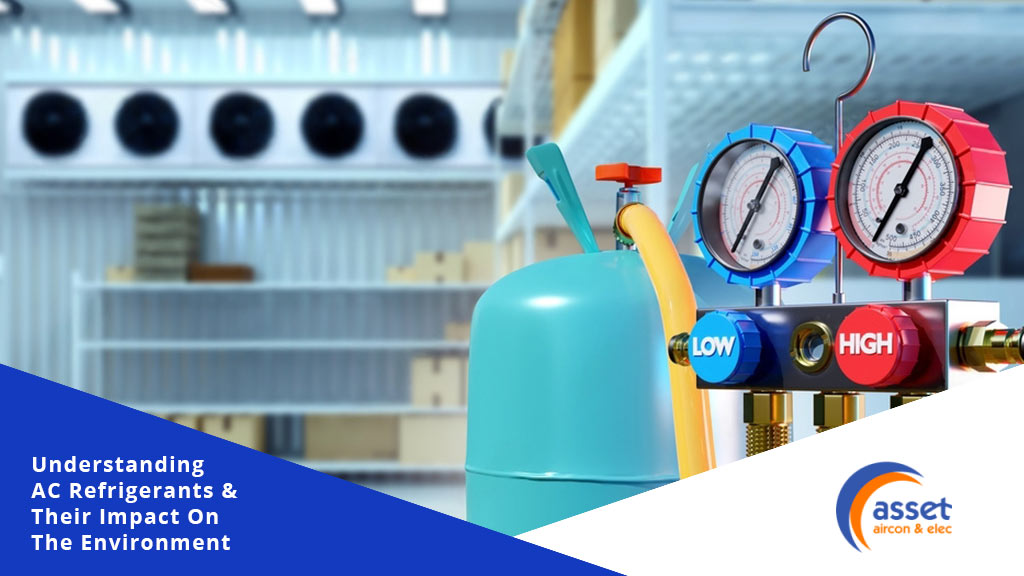Air Conditioning Refrigerants and the Environment
Our daily lives cannot function without air conditioning, especially in hot and humid climates. The compounds known as air conditioning refrigerants are responsible for cooling and dehumidifying the air in air conditioning systems. They are essential parts of air conditioning systems to keep the indoor environment cool and comfortable since they absorb heat from the internal environment and release it outdoors.
Air conditioning systems absorb heat from the indoor environment and release it outdoors through refrigeration. Although essential to this process, refrigerants also significantly affect the environment. Understanding the impact of air conditioning refrigerants on the environment is essential for making informed choices about the type of refrigerant to use in air conditioning systems.
What are Air Conditioning Refrigerants?
Chemical substances called air conditioning refrigerants are used in air conditioning systems to absorb and release heat. Refrigerants, also called coolants or simply “freon,” are essential components of air conditioning systems because they enable the system to collect heat from the indoor environment and release it outdoors.
Refrigerants are substances used in air conditioning systems to transfer heat. There are different types of refrigerants, but the most commonly used ones are:
- Hydrochlorofluorocarbons (HCFCs) are refrigerants widely used in air conditioning systems until recently. These refrigerants have a relatively low impact on the ozone layer but are potent greenhouse gases contributing to climate change.
- Chlorofluorocarbons (CFCs) were once widely used in air conditioning systems. Still, they are banned in many countries because they are potent greenhouse gases that contribute to climate change and cause ozone depletion.
- Hydrofluorocarbons (HFCs) are a newer type of refrigerant developed to replace CFCs and HCFCs. HFCs have a relatively low impact on the ozone layer but are potent greenhouse gases contributing to climate change.
- Natural Refrigerants – Natural refrigerants occur naturally in the environment and can be used as refrigerants. These substances include carbon dioxide, ammonia, and hydrocarbons. Natural refrigerants have a much lower impact on the environment than synthetic refrigerants.
Impact of Air Conditioning Refrigerants on the Environment
Air conditioning refrigerants have a significant effect on the environment. The result of these refrigerants on the environment is mainly due to their effect on the ozone layer and their contribution to climate change.
- Ozone Depletion – Certain air conditioning refrigerants, such as CFCs and HCFCs, are potent ozone-depleting substances. The ozone layer, which shields the globe from damaging UV radiation, can be destroyed when these refrigerants are released into the atmosphere and interact with ozone molecules. Depleting the ozone layer can lead to increased rates of skin cancer, cataracts, and other health problems.
- Climate Change – Air conditioning refrigerants, particularly HFCs, are potent greenhouse gases contributing to climate change. These refrigerants have a much higher global warming potential than carbon dioxide, the most significant greenhouse gas. HFC use in air conditioning systems will contribute significantly to global warming in the coming years.
Alternative refrigerants with lower GWP have been developed to lessen the environmental impact of refrigerants. Some of these alternatives include hydrocarbons, ammonia, and carbon dioxide. These alternatives have been shown to have a lower impact on the environment, but they also have challenges, such as safety concerns and compatibility with existing equipment. In addition to using alternative refrigerants, there are other ways to reduce the impact of air conditioning systems on the environment. Regular maintenance and cleaning of air conditioning systems can improve efficiency and reduce refrigerant needed. Proper disposal of old or unused refrigerants can also prevent them from entering the environment.
It is important to choose a reputable air conditioning company that is committed to using environmentally friendly practices. Air Conditioning Gold Coast | Asset Aircon & Elec is an Air Conditioning Gold Coast company that offers various air conditioning services, including installation, maintenance, and repairs. They are committed to using environmentally friendly products and practices and prioritize customer satisfaction. If you want to reduce the impact of your air conditioning system on the environment, contact Asset Aircon today.









